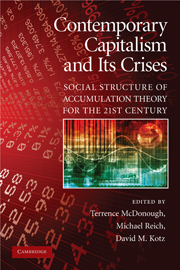Book contents
- Frontmatter
- Contents
- List of Tables
- List of Figures
- List of Contributors
- Acknowledgments
- Introduction: Social Structure of Accumulation Theory for the 21st Century
- PART I THE THEORY OF SOCIAL STRUCTURES OF ACCUMULATION
- PART II GLOBALIZATION AND THE CONTEMPORARY SOCIAL STRUCTURE OF ACCUMULATION
- 4 Global Neoliberalism and the Contemporary Social Structure of Accumulation
- 5 Globalization or Spatialization? The Worldwide Spatial Restructuring of the Labor Process
- 6 Financialization in the Contemporary Social Structure of Accumulation
- 7 Global Neoliberalism and the Possibility of Transnational State Structures
- PART III THE CONTEMPORARY SOCIAL STRUCTURE OF ACCUMULATION IN THE UNITED STATES
- PART IV SOCIAL STRUCTURE OF ACCUMULATION THEORY AND TRANSFORMATIONS OF THE CAPITALIST PERIPHERY
- Index
- References
4 - Global Neoliberalism and the Contemporary Social Structure of Accumulation
Published online by Cambridge University Press: 05 June 2012
- Frontmatter
- Contents
- List of Tables
- List of Figures
- List of Contributors
- Acknowledgments
- Introduction: Social Structure of Accumulation Theory for the 21st Century
- PART I THE THEORY OF SOCIAL STRUCTURES OF ACCUMULATION
- PART II GLOBALIZATION AND THE CONTEMPORARY SOCIAL STRUCTURE OF ACCUMULATION
- 4 Global Neoliberalism and the Contemporary Social Structure of Accumulation
- 5 Globalization or Spatialization? The Worldwide Spatial Restructuring of the Labor Process
- 6 Financialization in the Contemporary Social Structure of Accumulation
- 7 Global Neoliberalism and the Possibility of Transnational State Structures
- PART III THE CONTEMPORARY SOCIAL STRUCTURE OF ACCUMULATION IN THE UNITED STATES
- PART IV SOCIAL STRUCTURE OF ACCUMULATION THEORY AND TRANSFORMATIONS OF THE CAPITALIST PERIPHERY
- Index
- References
Summary
Introduction
There is broad agreement among social analysts that capitalism changed in significant ways starting around 1980. However, there is disagreement about how to characterize those changes, what the key features of capitalism have been in recent decades, and what name to apply to the contemporary form of capitalism. In our view, the concept of “global neoliberalism” best captures the contemporary social reality.
In Europe liberalism has long referred to a stance that advocates limited government intervention in the economy. States were generally less active in seeking to manage capitalist economies before the Great Depression of the 1930s than they were after World War II. This does not mean that capitalist states followed a consistently laissez-faire approach in the past. Chang (2002) has shown that states actively promoted industrialization in every major developed capitalist country during its period of early development. In late developers such as Germany and Japan, the state was even more active than in the earliest cases. However, once industrialization was completed, in most developed capitalist countries the state played a relatively limited role in the economy prior to the Great Depression.
Following the Great Depression and World War II, new national social structures of accumulation (SSAs) emerged in the capitalist world in which the state actively regulated the macroeconomy as well as key economic sectors, nationalized some industries in many countries, and provided a set of social programs that is often summed up as the “welfare state.
- Type
- Chapter
- Information
- Contemporary Capitalism and its CrisesSocial Structure of Accumulation Theory for the 21st Century, pp. 93 - 120Publisher: Cambridge University PressPrint publication year: 2010
References
- 30
- Cited by



